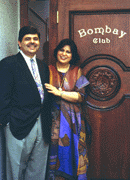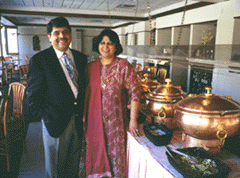|
MEET YOUR HOSTS!
 Vinod
& Shikha Kapoor are the owners of the Bombay Club
in Harvard Sq. They started off as owners of a small
basement restaurant in Back Bay called Kebab-N-Kurry
in 1980. After winning the Best of Boston in the early
80's they decided to expand their business. They opened
another Kebab-N-Kurry in Providence, R.I. After several
years of success in the business of Indian Cuisine,
they opened Bombay Club in 1991. This was a change from
the traditional Indian restaurant. They decided that
the Indian Restaurant Industry needed a more upscale
dining facility. They proved that when they opened the
126 seat, well decorated, and operated Bombay Club. Vinod
& Shikha Kapoor are the owners of the Bombay Club
in Harvard Sq. They started off as owners of a small
basement restaurant in Back Bay called Kebab-N-Kurry
in 1980. After winning the Best of Boston in the early
80's they decided to expand their business. They opened
another Kebab-N-Kurry in Providence, R.I. After several
years of success in the business of Indian Cuisine,
they opened Bombay Club in 1991. This was a change from
the traditional Indian restaurant. They decided that
the Indian Restaurant Industry needed a more upscale
dining facility. They proved that when they opened the
126 seat, well decorated, and operated Bombay Club.
Vinod Kapoor's
experience is closer to the traditional immigrant experience,
but he owes his success more to the Indian virtues of
thrift, industry, and family than he does to the efficacy
of the American free enterprise system.
Back in 1981 when he wanted to open his first restaurant,
he was turned down by three banks. Without the support
of a brother-in-law who loaned him the $30,000 he needed
to buy the 40-seat Kebab-N-Kurry, in Back Bay, he might
still be a store manager for Fayva Shoes.
Instead, he and his wife, Shikha, turned
the dying restaurant around, paid off the loan in two
years, went on to open a second Kebab-N-Kurry near Brown
University, in Providence, and eventually the 126 seat
Bombay Club in Harvard Square and the Bombay Club takeout
at the Burlington Mall. In the five years since it opened,
Bombay Club has earned a national reputation for excellence,
won a slew of awards, and has become the Indian restaurant
of choice for celebrities like Robert Plant and Ravi
Shankar when they're in town - not to forget the Indian
stars who come to visit their children at Harvard and
dine in the kind of relaxed anonymity that would be
impossible in Bombay.
 There
are many reasons why Vinod, now 46, and Shikha, 43,
are successful. It wasn't just the loan. They worked
hard. Vinod ran the restaurant while Shikha kept her
job as a bank teller and worked in the restaurant at
night. They created a welcoming ambiance for the largely
student clientele, upgraded the quality of the food,
and eschewed preservatives, additives, and artificial
colorings. Because they couldn't get the spices they
wanted in Boston at that time, once a month they rented
a station wagon, got up before dawn, drove to New York,
loaded up with spices from India, and then drove back
to Boston in time to open at night. They kept the spices
in sealed plastic bags and ground what they needed fresh
every day. There
are many reasons why Vinod, now 46, and Shikha, 43,
are successful. It wasn't just the loan. They worked
hard. Vinod ran the restaurant while Shikha kept her
job as a bank teller and worked in the restaurant at
night. They created a welcoming ambiance for the largely
student clientele, upgraded the quality of the food,
and eschewed preservatives, additives, and artificial
colorings. Because they couldn't get the spices they
wanted in Boston at that time, once a month they rented
a station wagon, got up before dawn, drove to New York,
loaded up with spices from India, and then drove back
to Boston in time to open at night. They kept the spices
in sealed plastic bags and ground what they needed fresh
every day.
Their attention to detail is remarkable.
An example: Scarcely a reviewer visits Bombay Club without
mentioning the selection and quality of its breads.
Excerpt from Boston Magazine, Nov. 1996
|

 AWARDS
& REVIEWS
| BOMBAY
CLUB MENU | BUFFET
| CATERING
| MEET
YOUR HOSTS
AWARDS
& REVIEWS
| BOMBAY
CLUB MENU | BUFFET
| CATERING
| MEET
YOUR HOSTS
 AWARDS
& REVIEWS
| BOMBAY
CLUB MENU | BUFFET
| CATERING
| MEET
YOUR HOSTS
AWARDS
& REVIEWS
| BOMBAY
CLUB MENU | BUFFET
| CATERING
| MEET
YOUR HOSTS